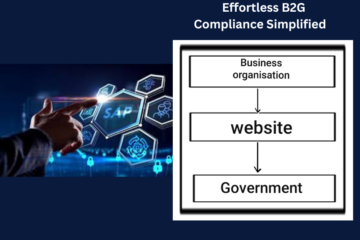Embrace the Future with Confidence:
Leveraging Over 100 Successful GST Implementations in Malaysia, Our Team Brings Unmatched Expertise to the E-Invoicing Landscape. Trust Us to Navigate Regulatory Changes and Drive Seamless Transitions, Empowering Your Business for Success in the Digital Age.
The Malaysian business landscape is on the cusp of a digital revolution with the mandatory implementation of e-invoicing from August 2024. This initiative by the Inland Revenue Board (IRB), also known as the Lembaga Hasil Dalam Negeri (LHDN), unlocks a treasure trove of opportunities, particularly for companies already utilizing SAP ERP systems. Let’s explore the exciting landscape of e-invoicing and how SAP empowers businesses to navigate it seamlessly.
Enhanced Efficiency and Streamlined Processes:
SAP ERP acts as a central nervous system for businesses, and e-invoicing integrates beautifully with it. Gone are the days of duplicated data entry and manual workflows. By leveraging SAP’s e-invoicing capabilities, companies can automatically generate e-invoices directly from sales orders and deliveries within their existing ERP framework. This eliminates errors, saves time, and streamlines the entire invoicing process, ultimately leading to faster processing times and improved efficiency for LHDN as well.

Image Credit: https://www.hasil.gov.my
Seamless Integration and Real-time Visibility:
SAP’s e-invoicing solution seamlessly integrates with the MyInvois portal, a platform developed by LHDN specifically for e-invoicing. This ensures effortless submission and validation of e-invoices, fostering a more collaborative environment between businesses and the tax authority. Real-time visibility into the e-invoicing process allows for better control and faster invoice settlements. Companies can track the status of invoices, identify potential delays, and improve cash flow management, while LHDN benefits from increased transparency and faster access to accurate tax data.
Simplified Compliance and Reduced Administrative Burden:
SAP automates e-invoice formatting and data validation, ensuring compliance with IRB (LHDN) regulations. Businesses can bid farewell to manual data manipulation and potential compliance issues. This reduces the administrative burden associated with traditional invoicing, freeing up valuable resources for core functionalities. Additionally, streamlined data exchange between businesses and LHDN minimizes the need for manual verification and audits, saving time and resources for both parties.
Reduced Errors and Enhanced Data Security:
SAP’s robust security protocols safeguard sensitive financial information throughout the e-invoicing process. Data encryption and access controls minimize the risk of fraud and unauthorized access. Additionally, the automated nature of e-invoicing reduces the likelihood of human error that can lead to inconsistencies and delays. This not only benefits businesses but also strengthens LHDN’s ability to rely on accurate data for tax collection and analysis.
A Stepping Stone Towards Digital Transformation:
By adopting SAP’s e-invoicing solution, companies embark on a journey towards broader digitalization. This integration fosters a more cohesive ecosystem, enabling businesses to explore other digital tools and applications within the SAP suite. This comprehensive approach empowers companies to operate more efficiently and gain a competitive edge. Additionally, successful implementation of e-invoicing paves the way for further digital initiatives by LHDN, leading to a more modern and efficient tax administration system in Malaysia.
Bottomline:
E-invoicing in Malaysia presents a golden opportunity for businesses to streamline operations, enhance security, and ensure compliance with LHDN regulations. By leveraging the power of SAP ERP, companies can navigate this transition smoothly and emerge with a competitive advantage in the digital age. Embrace e-invoicing with SAP and unlock a brighter future for your business and contribute to a more efficient tax ecosystem in Malaysia!



0 Comments